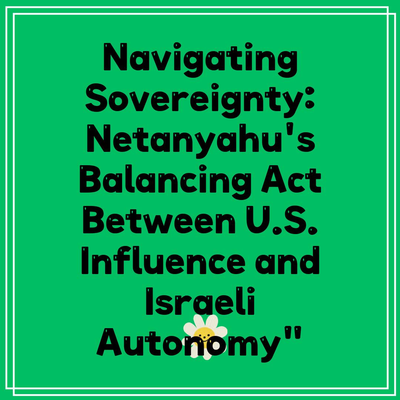
< lang=”en”>
Understanding Netanyahu’s Connection to U.S. Policies
The dynamic between Israel and the United States has been a focal point of international relations for decades. Recently, the spotlight has been on Benjamin Netanyahu, the Israeli Prime Minister, and his increasingly close ties with the U.S. administration. This ongoing relationship raises important questions about the sovereignty of Israeli policy-making and sheds light on the broader implications for regional stability.
The Current Political Landscape
As geopolitical tensions escalate in the Middle East, Netanyahu has sought to reinforce his government’s alignment with U.S. foreign policy. This comes amid a backdrop of challenges, including Iran’s nuclear ambitions and ongoing territorial conflicts. The Israeli leader faces pressure from both within and outside his government to maintain strong partnerships, especially with key U.S. allies.
Recent developments indicate a consolidation of Netanyahu’s power as he adopts positions that resonate with U.S. interests. Critics argue that this alignment compromises Israel’s autonomous decision-making and transforms Netanyahu into an ally more beholden to U.S. whims than to the needs and desires of the Israeli people.
Implications of U.S. Influence
The assertion that Netanyahu’s administration is heavily influenced by the United States is not unfounded. American financial assistance and military support have been vital for Israel’s defense capabilities. Many analysts posit that decisions regarding settlements, military actions, and diplomatic stances are often intertwined with U.S. strategic priorities. This dependence prompts concerns about the future trajectory of Israeli independence.
Furthermore, domestic policies within Israel can be heavily impacted by American expectations. As Netanyahu navigates a complex political terrain, he must balance international pressures with domestic demands. The recent media reports suggest that the increasing influence of the U.S. administration on Israeli policies may lead to decisions that prioritize U.S. interests over local considerations.
The Strategic Agenda Moving Forward
With Netanyahu currently in power, his administration aims to align with U.S. objectives, particularly around security. The Biden administration has expressed concerns about any Israeli actions that could escalate tensions with neighboring states, which puts additional pressure on Netanyahu. For instance, proposed military interventions or settlement expansions might face increased scrutiny if they are perceived to undermine U.S. diplomatic efforts in the region.
Moreover, there is a burgeoning public debate within Israel about the ramifications of such dependency. Opposition leaders argue for a more self-reliant foreign policy that prioritizes Israeli interests and values. This discourse highlights the complexity of Netanyahu’s position and the dual expectations he faces from his own constituency and the international community.
Conclusion: The Future of U.S.-Israel Relations
In essence, Netanyahu’s leadership reflects a delicate balance between accommodating U.S. influence and addressing the unique needs of Israel. The future of this relationship will likely shape the geopolitical landscape of the Middle East in significant ways. As pressures mount from various fronts, will Netanyahu adapt his approach to reflect an independent Israeli agenda, or will he continue to align closely with American interests? Only time will reveal the trajectory of Israeli policies in a world where U.S. relations remain a dominant force.


